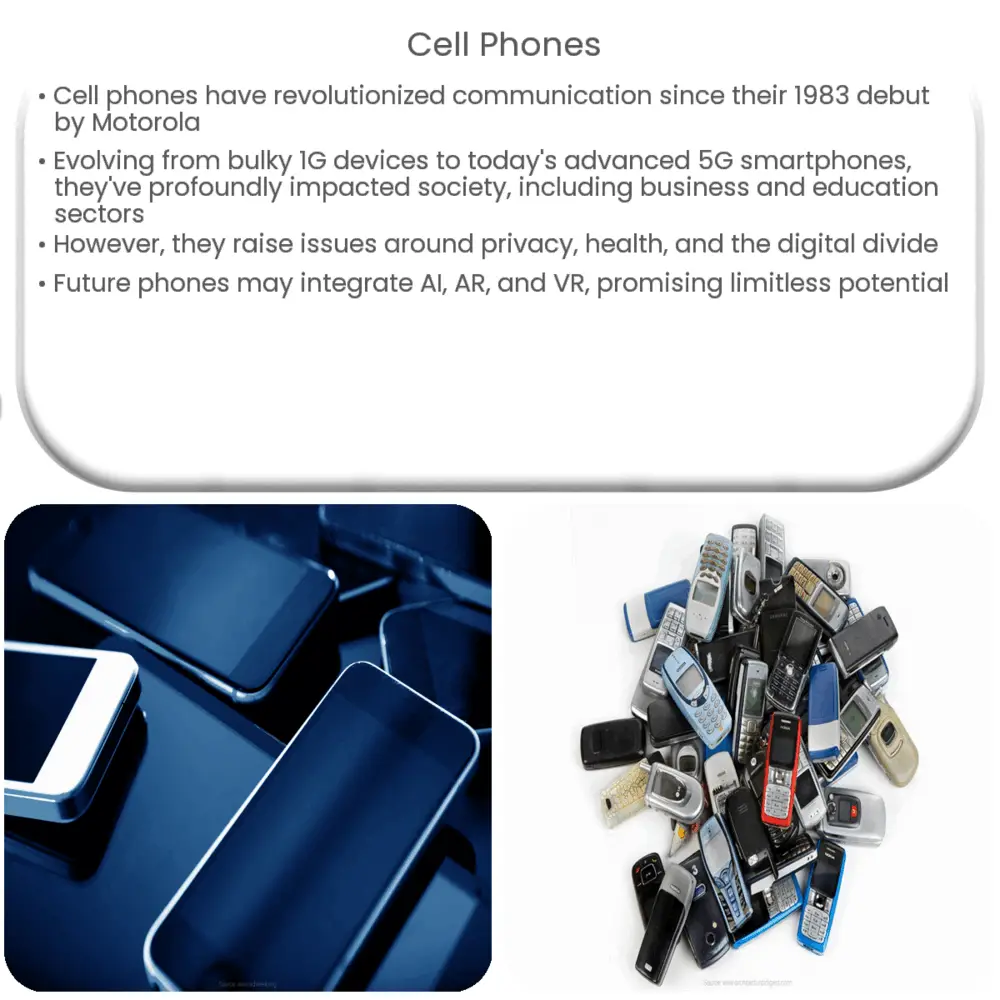Explore the evolution, impact, and future of cell phones. Understand their role in society, the digital divide, and emerging technologies.

Evolution and Impact of Cell Phones
The invention of the cell phone, also known as a mobile phone, has revolutionized the way humans communicate and interact. This handheld, portable device, which was once a mere concept, has now become a necessity in everyday life.
The Origin of Cell Phones
Cell phones originated from the invention of the telephone by Alexander Graham Bell in the 19th century. However, it wasn’t until the late 20th century that mobile communication technology really took off. Motorola, an American telecommunications company, is credited with developing the first portable cell phone, the DynaTAC 8000X, in 1983.
Evolution of Cell Phones
- The First Generation (1G): The first generation of cell phones was analog and only supported voice calls. They were quite bulky and expensive.
- The Second Generation (2G): Introduced in the early 1990s, 2G phones were smaller and more affordable. They brought about the transition from analog to digital communication, introducing features such as text messaging (SMS) and voicemail.
- The Third Generation (3G): The dawn of the 21st century saw the emergence of 3G phones, which enabled internet access, video calling, and mobile TV.
- The Fourth Generation (4G): 4G phones, introduced in 2009, provided faster internet speeds, high-quality video streaming, and improved gaming experiences.
Modern Cell Phones
Today, we live in the era of 5G phones, the fifth generation of cellular technology. 5G offers extremely fast internet speeds, lower latency, and the capacity to connect more devices at once. Modern smartphones, which are essentially handheld computers, have advanced capabilities such as high-resolution touchscreens, powerful processors, large memory capacity, and high-quality cameras. The advent of smartphones has not only transformed communication but also impacted various sectors such as business, entertainment, and education.
Impact of Cell Phones on Society
The influence of cell phones on society is profound. With a cell phone, individuals can easily connect with others, access information, and perform various tasks. Cell phones have also transformed the business landscape, enabling mobile banking, e-commerce, and remote work. However, they have also raised concerns about privacy, health, and social relationships, making it crucial to use them responsibly.
Cell Phones and the Digital Divide
Despite the widespread use of cell phones, it’s important to acknowledge the digital divide – a gap between those who have access to modern communication technology and those who don’t. This divide exists not only between developed and developing countries but also within individual countries, often along socio-economic lines. Efforts are underway globally to bridge this gap and ensure that everyone can benefit from the opportunities provided by cell phones.
Future of Cell Phones
The future of cell phones is exciting and full of possibilities. With advancements in technologies such as Artificial Intelligence (AI), Augmented Reality (AR), and Virtual Reality (VR), future cell phones are expected to become even more integrated into our daily lives. For instance, we could see phones that can project holograms, offer immersive gaming experiences, or even serve as digital assistants with advanced AI capabilities.
Conclusion
In conclusion, cell phones have come a long way since their inception. From bulky devices used only for voice calls, they have evolved into sophisticated gadgets that offer a myriad of functionalities. They have profoundly transformed society, enabling instantaneous global communication, easy access to information, and the democratization of technology. However, as we enjoy the conveniences brought by cell phones, it’s crucial to address the challenges they pose, including privacy issues, health concerns, and the digital divide. As we look towards the future, the potential of cell phones is limitless, promising to bring about even more radical transformations in the way we live and interact.

